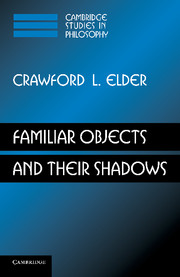Book contents
- Frontmatter
- Contents
- Acknowledgments
- Introduction
- 1 Two false friends of an ontology of familiar objects
- 2 Conventionalism as ontological relativism
- 3 Realism about material objects: persistence, persistence conditions, and natural kinds
- 4 Ontological preference for the temporally small
- 5 Ontological preference for microphysical causes
- 6 Ontological preference for the spatially small
- 7 A third false friend of familiar objects: universal mereological composition
- 8 Concluding Hegelian postscript
- Appendix: “Mutually interfering” dimensions of difference
- References
- Index
6 - Ontological preference for the spatially small
Published online by Cambridge University Press: 25 January 2011
- Frontmatter
- Contents
- Acknowledgments
- Introduction
- 1 Two false friends of an ontology of familiar objects
- 2 Conventionalism as ontological relativism
- 3 Realism about material objects: persistence, persistence conditions, and natural kinds
- 4 Ontological preference for the temporally small
- 5 Ontological preference for microphysical causes
- 6 Ontological preference for the spatially small
- 7 A third false friend of familiar objects: universal mereological composition
- 8 Concluding Hegelian postscript
- Appendix: “Mutually interfering” dimensions of difference
- References
- Index
Summary
Here is a line of reflection that has dominated much recent metaphysics. Science gives us good reason to suppose that the familiar objects that common sense believes in are, if real at all, composed wholly of tiny microparticles – either of the microparticles that current microphysics regards as fundamental, or of other microparticles, perhaps smaller or stranger, that a perfected future microphysics will recognize. Yet as philosophers we must entertain seriously the possibility that some of these familiar objects do not really exist. Where common sense supposes there to be a tree or a baseball or a dog, we must be willing to say, there may just be many, many microparticles. It still would be possible to explain why common sense supposes, and is rewarded for supposing, that in just these regions there is a tree or a baseball or a dog. The explanation would be that the microparticles in these regions are arranged towards one another in particular ways, ways that reward the common-sense belief in a single object of a particular kind. Thus where common sense supposes that there is a dog, there might really be just microparticles dogwise arranged. We need not pause long to consider what dogwise (or treewise or baseballwise) arrangement consists in or amounts to. For, since it is certain that the world rewards the common-sense belief in dogs (and trees and baseballs), it is certain that that arrangement, whatever exactly it is, obtains among the microparticles in various regions.
- Type
- Chapter
- Information
- Familiar Objects and their Shadows , pp. 114 - 138Publisher: Cambridge University PressPrint publication year: 2011



